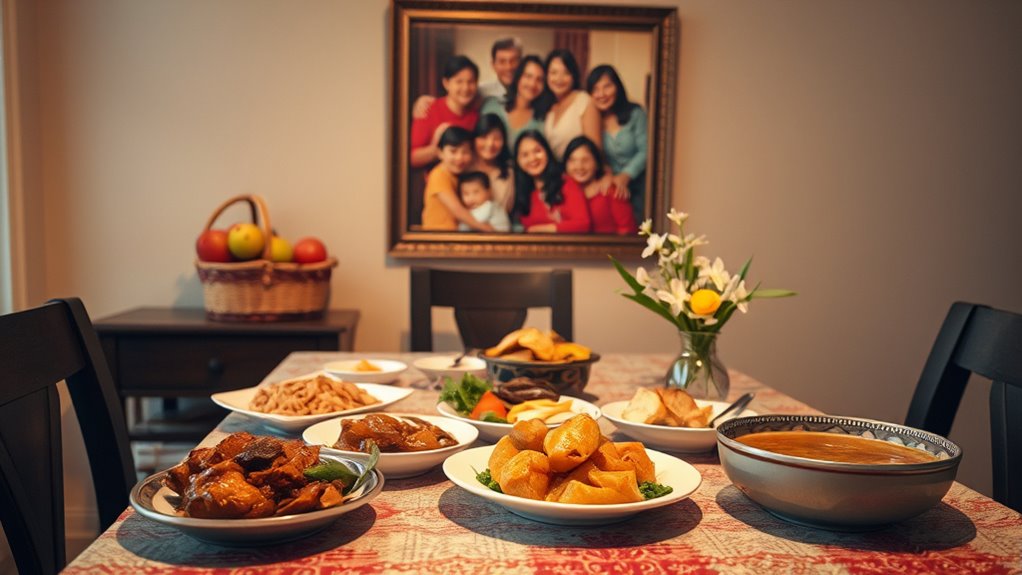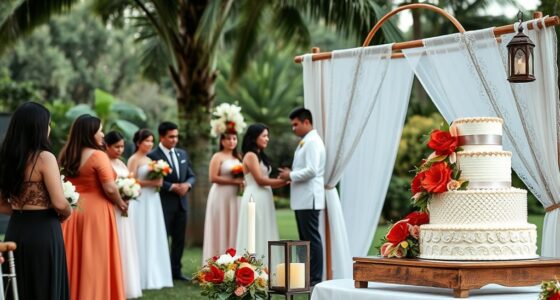To prepare for your first visit to your Filipina’s family, embrace their close-knit family values by greeting elders respectfully and engaging in conversations. Dress appropriately in smart-casual or formal attire, depending on the occasion. Bring a small gift, like sweets, to show appreciation. Enjoy the traditional Filipino meal together, waiting for the host to start eating. Finally, keep conversations light and engaging, showing interest in their culture. There’s so much more to discover about making a great impression!
Key Takeaways
- Dress appropriately in smart-casual or formal attire to show respect for the occasion and family values.
- Bring a small token of appreciation, like sweets or food, presented nicely with both hands.
- Engage in conversation by asking about their interests and sharing light anecdotes to build rapport.
- Embrace traditional Filipino meals by trying a variety of dishes and waiting for the eldest to start eating.
- Show respect for elders by greeting them warmly and participating actively in family activities.
Understanding Filipino Family Values
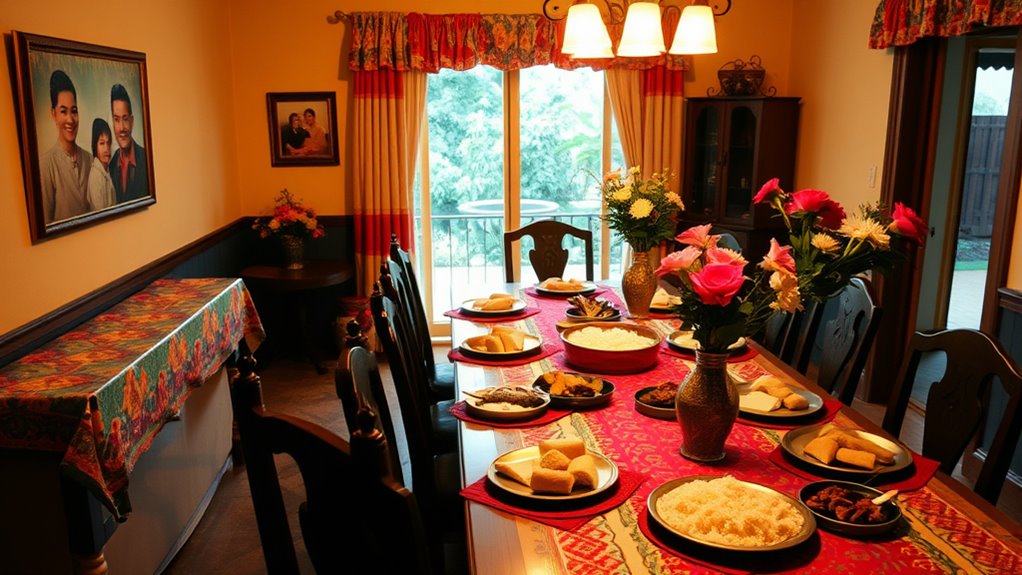
When you’re preparing for your Filipina’s family visit, it’s essential to grasp the essence of Filipino family values. Family is the cornerstone of Filipino culture, and you’ll find that close-knit relationships play a significant role.
Respect for elders is paramount, so be sure to greet and acknowledge everyone, especially older family members. You’ll notice that cooperation and support are highly valued, so try to participate in conversations and activities, showing your willingness to bond.
Additionally, hospitality is a big deal; you might be offered food and drinks frequently, so graciously accept and enjoy their offerings. Understanding these values will help you connect better with her family, making your visit more comfortable and memorable.
Dress Code and Attire Considerations
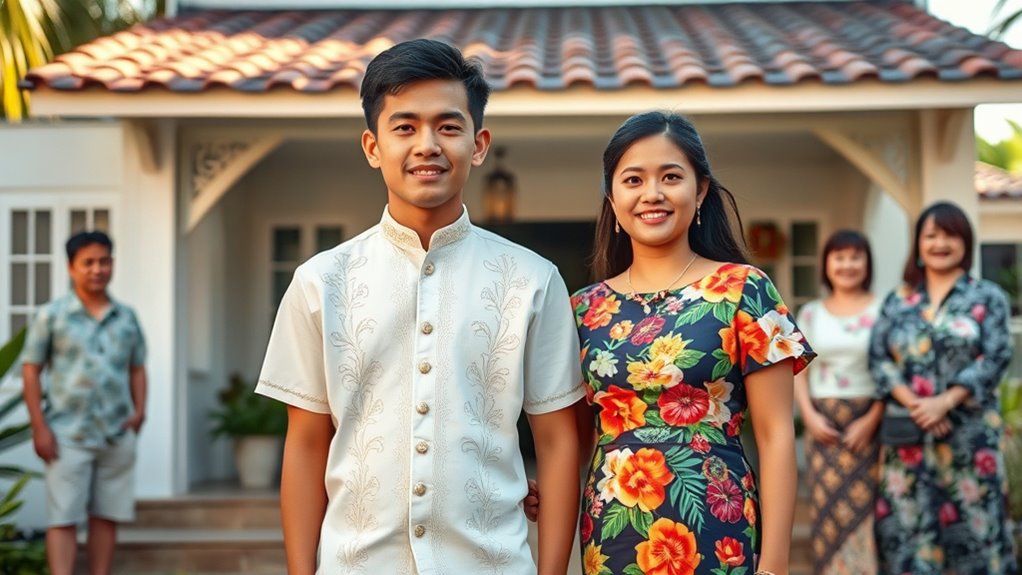
While you might be excited about your Filipina’s family visit, choosing the right attire is essential to making a good impression.
Start by considering the occasion and location. If it’s a casual gathering, opt for smart-casual clothing—think nice jeans or chinos paired with a polo or button-up shirt. If it’s a more formal event, a dress shirt and slacks show respect and effort.
Consider the occasion: smart-casual for casual gatherings and dress shirts for formal events to show respect.
Colors and patterns can also matter; avoid overly loud outfits and stick with subdued tones for a classic look.
Don’t forget about footwear; clean, polished shoes are always a safe bet.
Finally, verify your attire is comfortable, so you can focus on enjoying the time with her family rather than adjusting your clothes.
Gift-Giving Etiquette

Gift-giving plays a significant role in Filipino culture, so it’s important to approach it thoughtfully. When visiting your Filipina’s family, consider bringing a small token of appreciation, like food, sweets, or a local delicacy from your home country.
Avoid overly extravagant gifts, as they can make others feel uncomfortable. Instead, focus on something meaningful and personal. Presentation matters, so wrap your gift nicely to show you care.
When you hand over the gift, do so with both hands as a sign of respect. Additionally, be prepared for the possibility that your gift mightn’t be opened immediately; this is common practice in Filipino culture.
Ultimately, your thoughtfulness will be appreciated, fostering a warm and positive connection with her family.
Navigating Traditional Filipino Meals
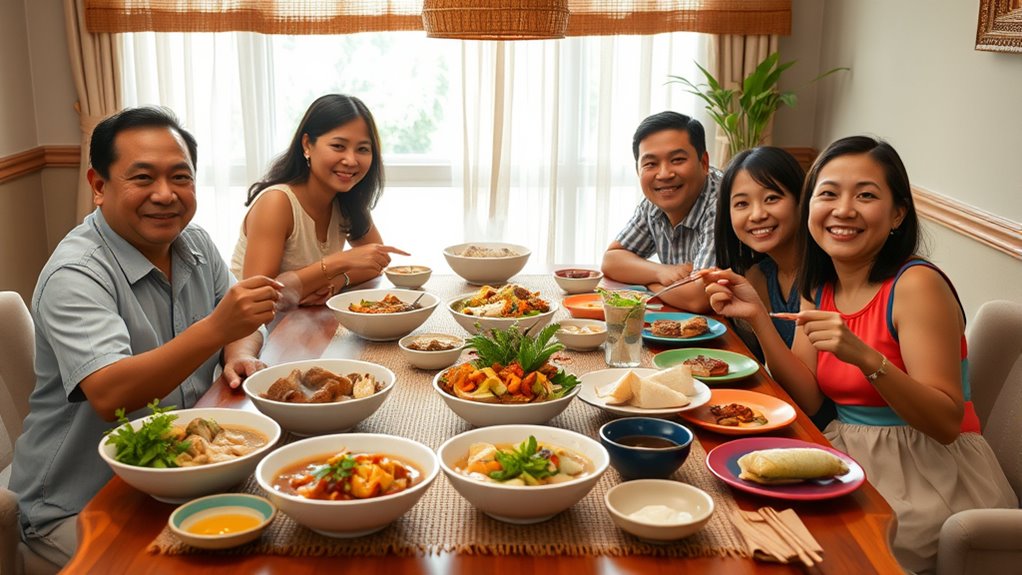
To truly connect with your Filipina’s family, you’ll want to embrace the experience of enjoying traditional Filipino meals together. Filipino cuisine is rich and diverse, featuring dishes like adobo, sinigang, and lechon that reflect the country’s vibrant culture.
Don’t be shy about trying everything; your willingness to taste different flavors shows respect and interest.
When you sit down to eat, remember that meals are often served family-style, so take a moment to observe how others serve themselves. It’s polite to wait for the eldest or host to start before you dig in.
Finally, be prepared for a generous spread—Filipinos love to feed their guests. Enjoy this culinary journey; it’s a gateway to building strong connections with your Filipina’s family.
Engaging in Conversation and Small Talk
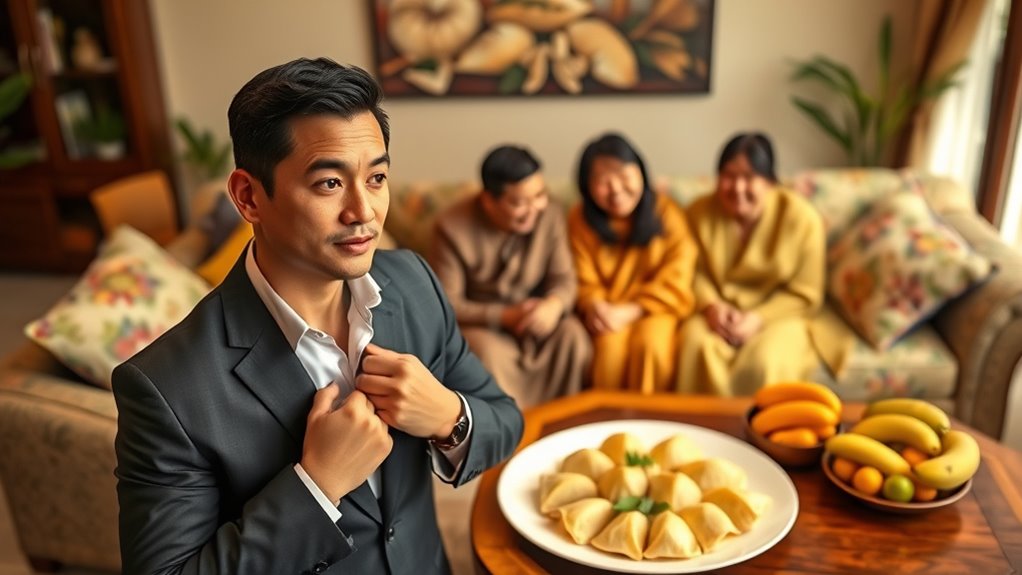
Engaging in conversation and small talk is essential when meeting your Filipina’s family, as it helps break the ice and shows your genuine interest in getting to know them.
Start by asking simple questions about their interests, hobbies, or favorite Filipino dishes. Share a bit about yourself, but keep it light and relatable.
Filipinos love storytelling, so be prepared to listen and share anecdotes. Show enthusiasm and smile; warmth goes a long way.
If you sense a lull in the conversation, compliment the family’s home or ask about local traditions.
Respecting Cultural Customs and Practices

When meeting your Filipina’s family, respecting cultural customs and practices is essential for building trust and rapport.
Familiarize yourself with Filipino traditions, like greeting elders with a “mano,” where you take their hand and touch it to your forehead as a sign of respect.
Dress appropriately; smart casual is often a safe choice.
Be mindful of the importance of family gatherings, and always show gratitude for their hospitality, often expressed through food.
It’s polite to wait for the host to start eating before you dig in.
Finally, avoid sensitive topics, such as politics or religion, until you know them better.
Building Rapport With Family Members
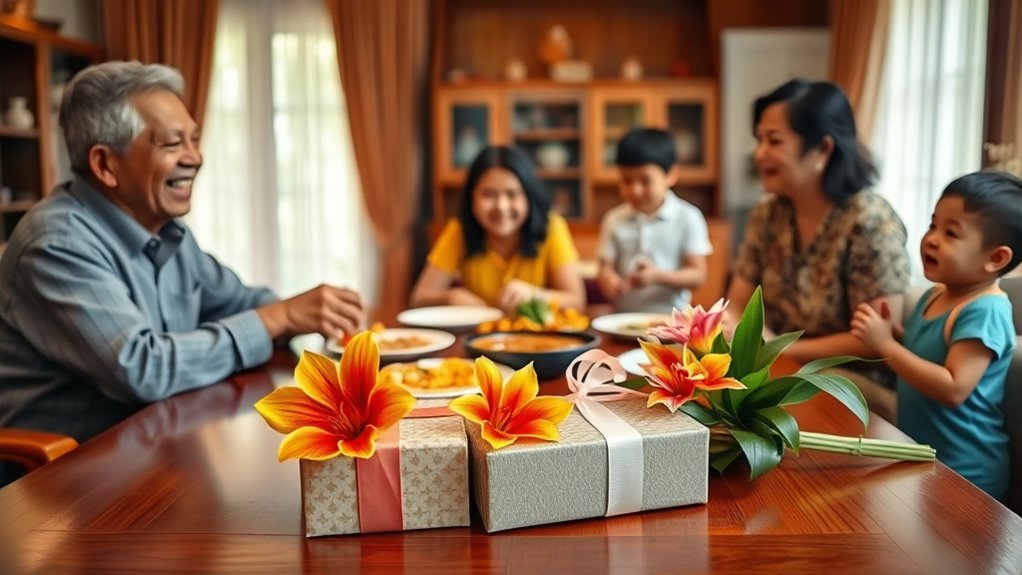
Building rapport with your Filipina’s family can greatly enhance your relationship and create a welcoming atmosphere. Start by showing genuine interest in their lives; ask questions about their hobbies, traditions, and experiences.
Listen actively and engage in conversations, as this illustrates respect and appreciation for their culture. Be mindful of body language; maintain eye contact and smile to convey warmth.
Small gestures, like bringing a thoughtful gift or helping with meal preparations, can go a long way in building connections. Remember to use their names during conversations, as it personalizes your interaction.
Finally, don’t hesitate to share a bit about yourself; openness fosters trust and strengthens bonds. Your effort will certainly be recognized and valued.
Frequently Asked Questions
What Should I Know About Filipino Family Hierarchy?
Filipino family hierarchy emphasizes respect and closeness among members.
You’ll often find elders holding significant authority, and it’s essential to show them proper respect.
Family ties are strong, and decisions are typically made collectively.
You’ll also notice that titles and relationships matter; addressing someone correctly can go a long way.
Understanding these dynamics helps you navigate interactions smoothly, making your experience more enjoyable and respectful during family gatherings.
Are There Any Specific Topics to Avoid During Conversations?
When you step into a conversation, it’s wise to sidestep certain sensitive subjects.
Politics and religion can stir the pot, so it’s best to keep things light and breezy. Personal finances might also make folks uncomfortable, so steer clear of money matters.
Instead, focus on family stories or shared interests—these are the bridges you’ll want to build. Keeping your chats friendly and respectful will guarantee everyone feels at ease and welcomed.
How Do I Address Elders Respectfully in Filipino Culture?
In Filipino culture, addressing elders respectfully is essential. You should use “po” and “opo” when speaking to them, which shows politeness.
When greeting, a slight bow or nod can also demonstrate respect. If their title is known, use it—like “Tatay” for father or “Tita” for aunt.
Always maintain a warm demeanor, as it reflects your respect. Engaging them in conversation with genuine interest will further strengthen your connection.
Is It Common to Bring a Plus One to Family Gatherings?
Bringing a plus one to family gatherings is like adding a splash of color to a canvas; it can enhance the experience.
In Filipino culture, it’s common to invite a partner or close friend, as family loves to meet new faces.
However, it’s best to check with your Filipina beforehand to confirm her family is comfortable with it.
Ultimately, your presence and respect for their traditions matter more than anything else!
How Do Filipinos Typically Handle Disagreements Within the Family?
Filipinos typically handle disagreements within the family by prioritizing harmony and respect.
You’ll notice they often prefer to discuss issues privately, avoiding confrontation in front of others. They value open communication, so you might find family members expressing their feelings calmly.
Apologies and reconciliation are important, and they often emphasize understanding each other’s perspectives.
If you’re involved in a disagreement, staying respectful and patient will help maintain positive relationships within the family.
Conclusion
Preparing for your first visit to your Filipina’s family can be both exciting and nerve-wracking. Remember, 85% of Filipinos prioritize family relationships, so showing genuine respect and interest in their traditions will go a long way. By embracing their values, dressing appropriately, and engaging in meaningful conversation, you’ll not only create a positive impression but also build lasting connections. Approach the experience with an open heart and mind, and you’ll surely make a memorable impact.
